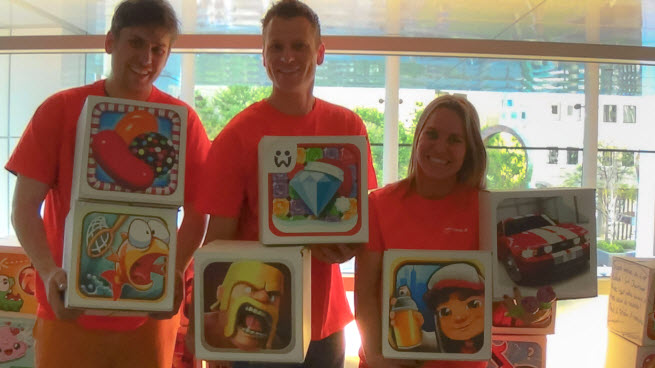Chartboost has created alternatives to expensive mobile advertising for game companies by enabling developers and publishers to promote games within their own networks. And now it is expanding into Europe with its first international office in Amsterdam.
The new office, headed by former game developer Ilja Goossens, will employ a staff of five and focus on helping the San Francisco-based company manage its fast growth in Europe. In the past 18 months, Chartboost has seen explosive growth in offering a developer-to-developer cross-promotion network. In short, creators promote each other’s games and advertise within them.
To date, more than 16,000 developers are using the network, and they’re seeing usage amounting to 8 billion game sessions a month, said Maria Alegre (pictured top right), in an interview with GamesBeat. That compares to 8,000 developers and 4 billion sessions a month just six months ago. Chartboost reaches 300 million unique monthly devices. That spectacular growth enabled Chartboost to raise $19 million in funding in a round led by Sequoia Capital in January.
“All of our growth has happened through word of mouth,” Alegre said.
Chartboost lets those developers advertise within each other’s games through a Direct Deals Marketplace, bypassing a traditional ad network, which takes part of the cut. In that exchange, a developer runs an ad for a different game, showing that ad only to other gamers, in contrast to other mobile ad networks. The other developer does the same in a kind of barter system. They can also advertise their games on the Chartboost network, paying a fee to Chartboost, which can handle the task in a more automated fashion so that the developer can concentrate on just creating a better game, Alegre said.
The business exists because with hundreds of thousands of mobile games, discovery is still the biggest challenge. To get noticed, many have had to pay a lot of money to acquire each additional user. But in free-to-play mobile games, where users play for free and pay real money for virtual goods, the revenue generated per user can often lag behind the user acquisition costs. Chartboost has a self-service program where developers trade traffic with each other.
“The network is automatic,” Alegre said. “You turn it on and forget about it. You get a check at the end of the month. The alternative for developers is to do a lot of the advertising work themselves.”
That, in turn, is helping to fuel the mobile gaming revolution where small developers are able to publish games on app stores and become profitable. Chartboost gets to witness a lot of that, and it has published data on the industry’s best practices.
Its network already includes European developers including Danish studio Kiloo, U.K.-based King and Natural Motion, Outfit7 from Slovenia, Wooga in Germany, and Finland’s Supercell. Alegre said about a third of the company’s developers are based in Europe. Many of them have games in the top charts.
“We’re going there to support something that already exists,” said Alegre, who is from Spain. “This is a bet that long-term relationship building will matter.”
Goossens, pictured in the middle, founded studios Gamundo and Virtual Fairground.
“As a game developer myself, I have lived through the challenges of building and launching games,” said Goossens, the regional director of Chartboost Europe. “What drew me to Chartboost was their passion for helping developers achieve success, and I’m excited to help our partners continue to grow their businesses worldwide.”
Alegre, who previously worked at Tapulous, said that her team understands the frustrations that developers have with the high cost of user acquisition.
Chartboost protects competitive information, but it shares data in a transparent way within the developer network.
Chartboost has 60 employees, more than double compared to a year ago. Also pictured on the left is Sean Fannan, Chartboost’s co-founder and chief technology officer.
VentureBeat's mission is to be a digital town square for technical decision-makers to gain knowledge about transformative enterprise technology and transact. Learn More

